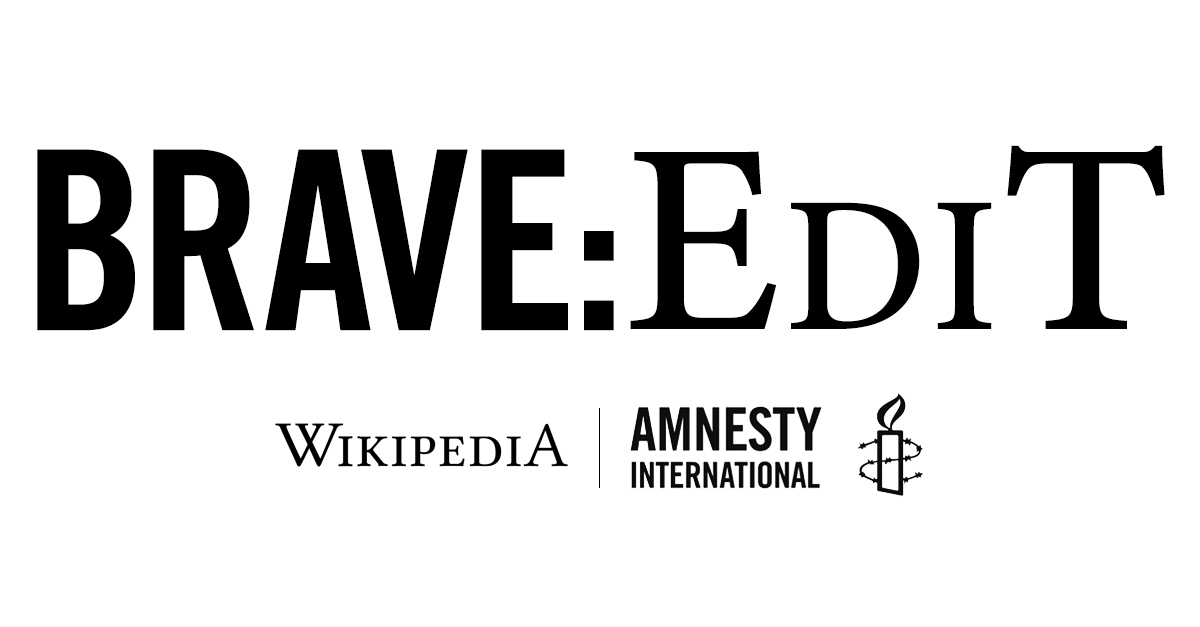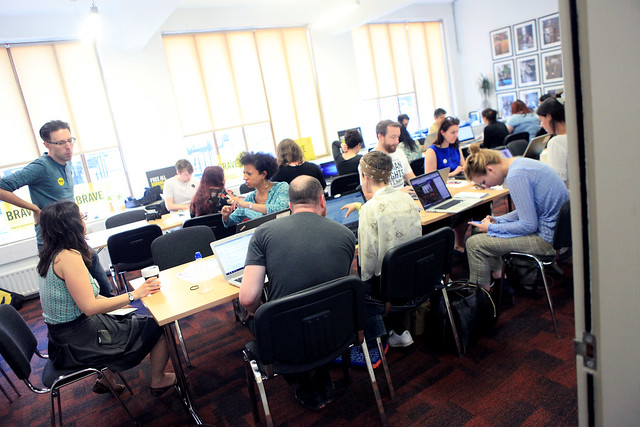BRAVE:Edit - How to edit Wikipedia pages

Did you know that only 17 per cent of notable profiles on Wikipedia are of women? Even fewer are of women human rights defenders.
You can change this.
We have partnered with Wikipedia to shine the spotlight on the unsung women defending human rights around the world.
BRAVE:Edit will see hundreds of online activists edit and write profiles in multiple languages of women human rights defenders whose brave work deserves to be recognised.
Women human rights defenders are systematically discriminated against. With a better understanding of who they are, the work they do and the injustices that hold them back every day, people can support them. Making these women more visible among Wikipedia’s millions of daily users will also make it harder for existing powers to ignore, repress, attack and silence them.
There are more than 5.5 million entries in the English language version of Wikipedia yet very few of them are devoted to the important work of human rights defenders, and even fewer to the women human rights defenders. There are stories of some truly inspirational women who have overcome huge obstacles and fought entrenched discrimination in defense of human rights. Activists will bring them to a worldwide audience where they belong.
Everyone is welcome to join BRAVE:Edit. To get you started, this page includes a guide on how to edit, update and add profiles on Wikipedia.
How to join our the edit-a-thon
Wikipedia is a free encyclopedia project, written and edited by anyone. Here's how you can become an editor.
Create an account
Click the ‘Sign in/create account’ link in the upper right-hand corner on the Wikipedia website. If you are concerned about your privacy, use a made-up name so you are not easily identifiable.
It may be a good idea to link your Wikipedia account with an email address to receive updates on entries you have edited; you’ll receive alerts and be able to monitor changes made by other editors.
Edit entries
You can now start making edits on Wikipedia. Note: it is possible to edit Wikipedia anonymously but entries will then be tied to your IP address.
If you have time to acquaint yourself with Wikipedia, visit the Wikipedia introduction page.
This page takes you through a set of tutorials (10 minutes each aimed at complete newcomers interested in contributing, by using either Wiki markup (similar to HTML language or the Visual editor (works more like a word processor.
Alternatively, view the Art+Feminism video about the anatomy of a Wikipedia Page.
When you are ready to start practicing your edits, use the Sandbox, a space designed for testing and experimenting with editing on Wikipedia.
You can watch a video about userpages and the Sandbox by Art+Feminism.
Create a new entry
Once you have created a registered account, Wikipedia considers you an ‘apprentice’. You can’t publish new articles straight away because Wikipedia expects you to practice your editing skills first. This can be as simple as making a few minor corrections to existing articles. When your account is at least four days old and you have made at least 10 edits, it will be unlocked (‘autoconfirmed’) and you will be able to create articles from scratch.
To create a new entry, try either of these two methods:
- Use the ‘creating drafts’ page. For help watch the video from Art + Feminism.
- Create a draft article in the Sandbox. Remember to keep saving it as you draft it by pressing the publish page button. To create a page, just add the title of your article to this basic URL en.wikipedia.org/wiki/ (for example: https://en.wikipedia.org/wiki/Abcdefgh and then press enter. Click on ‘Start the Abcdefgh article’. In the drafting space, copy and paste the draft you previously worked on in the Sandbox and finally click the ‘Publish page’ button at the bottom of the page.
Add pictures to a page
Adding photos to entries you add or edit increases traffic to that entry. You may use images that are copyright-free or released for Wikipedia use. See Wikipedia’s Image Use Policy for details. You can use Google’s usage rights search feature to find free-to-use images. You can use Wikipedia file upload Wizard to upload images.
For more information
- Consult the ‘Introduction to Wikipedia’ portal
- Art + Feminism, a campaign to improve the coverage of women in the arts on Wikipedia, have created resources and a series of training videos for new editors interested in addressing the gender bias in Wikipedia. See their editing kit at
- The Art + Feminism editing kit
- The BBC 100 women edit-a-thon page
- Read about Women in Red, a gender gap-bridging project on Wikipedia
Writing for Wikipedia
Here are some tips about writing for Wikipedia to ensure entries get posted and stay posted.
Notability and verifiability requirements
Wikipedia has both notability and verifiability requirements. Basically, why do they deserve an article? Your person of choice has to be ‘notable’.
Notability applies primarily to whether an individual can receive their own entry. Entries meet the ‘general notability guideline’ if they have received significant coverage in reliable sources independent of the subject. Notability on Wikipedia is an important rule that aims to prevent the proliferation of self-promotional or PR-led articles about actors, musicians and so on.
Verifiability applies primarily to citations. It is important to use reliable, publicly-available sources for citations so that other users can verify the information. Wikipedia considers academic resources the most reliable, although books, magazines, journals, mainstream newspapers and interviews are also considered reliable.
Wikipedia's style
Wikipedia is basically an encyclopedia written by a huge community of writers worldwide. All entries should be written in a neutral, factual style with no original content, and follow the verifiability and notability guidelines outlined above. Consult the Manual of Style for more details.
Write entries in an encyclopedia style. Include basic facts such as: name, birthdate, education, a fact about the individual’s work, what makes the individual notable, and their achievements and why they have been recognised.
Use an existing article as a guide to structure your own article. For example, you could copy and paste the text of this article about Berta Caceres in your Sandbox and type over details of your chosen subject.
We know that gender bias is an issue on Wikipedia and that unconscious bias can inform the entries we create. It is still important to create fact-based, neutral entries that do not represent your own personal opinions. Read this article to make sure you are not using sexist or stereotyping language, and consult this page to find out about the current usage of gender neutral pronouns.
Writing entries for Amnesty
To support effective creation of biographical content on Wikipedia, we would research information in secondary sources such as newspaper and magazine articles, books, academic articles and any Amnesty International publications or articles by other human rights organisations.
Ideally, we would want to include as much of the following info as possible: native name, date and location of birth, current residence, nationality, educated at, occupation, organisation, known for, parents, awards.
These are starting points: you should still Google facts and information to enrich your content with sound sources cited.
Citing sources
See Wikipedia, How to cite sources.
Monitoring your entries
Wikipedia is an open source and anyone can edit entries. It is likely that your entry will be edited or even removed and some of this will be beyond the project’s control. Writing in Wikipedia style, with properly sourced, encyclopedia-style text that is added to existing entries, will stand a greater chance of not being removed from Wikipedia.
After you have edited or created a new entry, it is a good idea to monitor how it is subsequently updated and edited by other Wikipedians. Link an email address to your Wikipedia account to ensure that you are informed of any changes to your entries.
Women defending human rights are subject to stigmatisation and bias in the digital sphere. Some of the edits to your entries may reflect gender bias or other inaccuracies. Monitor your entries to ensure that ‘bad edits’ do not go unnoticed.
Wikipedia has many dispute resolution guidelines and generally advises that editors add balancing citations to biased entries rather than deleting the text itself. Use Wikipedia Talk Pages to resolve disputes with other editors.
Get social
Let us know who you are adding by posting on your social channels using #BraveEdit, or you can email us at sct@amnesty.org.uk.
- Downloads
- Download the guide
